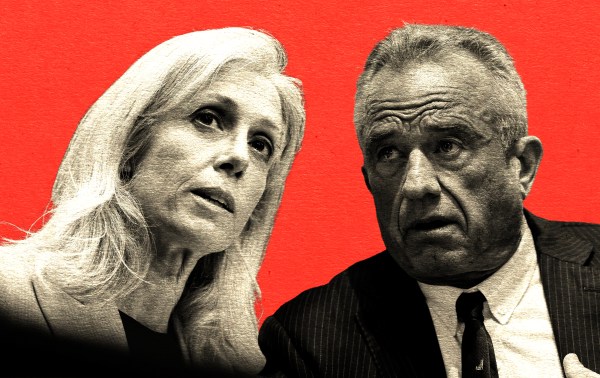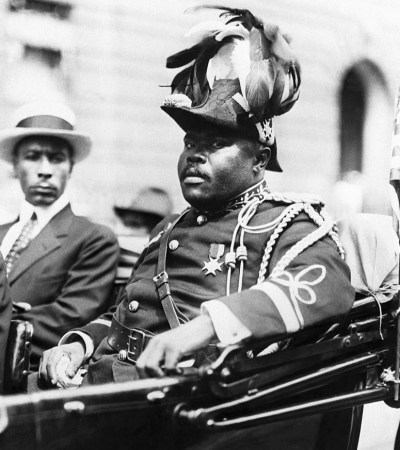Dear Reader (even those of you with Dingo tendencies),
So, I’m in a mood to annoy everyone—but for a reason, so bear with me.
Let’s start here. They told me that if America elected Donald Trump, the president would pardon fascists—and they were right.
I’m referring to Joe Biden and his pardon of Marcus Garvey.
Now first of all, I did warn you I’d be annoying (you can skip the Garvey discussion if you like).
In the 1920s, when Italian fascism was new, and German Nazism was an obscure fringe political cult almost no one had heard of, fascism was very popular in America. In 1923, the New York Times declared that Benito Mussolini “has many points in common with that of the men who inspired our own constitution – John Adams, Hamilton and Washington.” Legendary progressive economist Charles Beard had similar, albeit more pointed views. Sure, Mussolini was hostile to democracy, but so what? The “fathers of the American Republic, notably Hamilton, Madison, and John Adams, were as voluminous and vehement [in opposing democracy] as any Fascist could desire.”
Fact check: Untrue.
When someone asked how anyone could consider Mussolini’s brutality a “good thing,” Herbert Croly, the godfather of American progressivism and the cofounder of The New Republic, wrote that it was not “any more than it was a ‘good thing’ for the United States, let us say, to cement their Union by waging a civil war which resulted in the extermination of slavery. But sometimes a nation drifts into a predicament from which it can be rescued only by the adoption of a violent remedy.” That might explain some of his support for eugenics.
Fascism remained popular in some quarters well into the 1930s. Indeed, in 1937, Garvey, the founding father of black nationalism, insisted to the famous black historian J.A. Rogers that, “We were the first fascists.” He continued: “We had disciplined men, women, and children in training for the liberation of Africa. Mussolini copied fascism from me, but the Negro reactionaries sabotaged it.” (This quote is often truncated or slightly modified as it appears—and disappears—in different editions of Rogers’ work.)
The influential historian C.L.R. James—a Trinidadian Trotskyist (say that 10 times fast!)—wrote in 1938, that “All the things that Hitler was to do so well later, Marcus Garvey was doing in 1920 and 1921. He organized storm troopers, who marched, uniformed, in his parades and kept order and gave color to his meetings.”
James later recanted this assessment as the full scope of Hitlerism made the comparison unfair.
I’m no expert on Garvey, and things do get sufficiently confusing that I’m open to correction on some of this, but that Garvey passed the fascist duck test seems pretty defensible. He marched like a fascist, dressed like a fascist, and sounded like a fascist —particularly when he said he was a fascist! If you translated a lot of his rhetoric into German—“up, you mighty race!” and all that—you’d assume it was from a Nazi.
But it’s still all very complicated. For instance, Colin Grant, in his biography of Garvey, Negro With a Hat: The Rise and Fall of Marcus Garvey, writes:
With his invasion of Ethiopia, Mussolini’s rapacious imperial instincts had come to the fore. For any Negro worthy of the name, it was monstrous and galling. In July 1935, Garvey wrote to dispel some of the misleading statements in the English press like the Saturday Review which had printed a full-page photograph of the dictator under the caption, “Mussolini – the World’s Most Benevolent Ruler”. Garvey countered that “the real facts reveal Mussolini as a barbarian, compared to Haile Selassie, the Emperor of Abyssinia… the one man is a tyrant, a bully, an irresponsible upstart, whilst the other is a sober, courteous and courageous gentleman.”
But then Garvey zagged again, and began blaming Selassie for his own defeat. The emperor, you see, hadn’t followed Garveyite principles. Selassie thought he was white, Garvey claimed, and surrounded himself with white advisers, so he sorta had it coming. Even more confusing, Garvey’s original statement that “we were the first fascists” came after Mussolini invaded Ethiopia.
I think it’s fair to say that Garvey was a power worshipper and authoritarian. “Government should be absolute,” he insisted. “When we elect a President of a nation, he should be endowed with absolute authority to appoint all of his lieutenants from cabinet ministers, governors of States and Territories, administrators and judges to minor offices.” But he was also an anticommunist (communism, he said, was “a white man’s creation to solve his own political and economical problems”). And he was a capitalist. “Capitalism,” he insisted, “is necessary to the progress of the world, and those who unreasonably and wantonly oppose or fight against it are enemies to human advancement.”
He wasn’t particularly antisemitic (though it’s worth noting, neither was Benito Mussolini in the 1920s). He’d offer the rare and occasional swipe at international Jewry, but he also supported Zionism as the Jewish version of his own Back to Africa movement. It wasn’t until his 1923 trial for mail fraud in the U.S. that he started really tearing into the Jews, because he believed they were biased against him at his trial. Both the prosecutor and the judge were Jewish, and the fraud scheme involved a Jewish guy, Anton Silverstone. ‘The peculiar and outstanding feature of the whole case is that I am being punished for the crime of the Jew, Silverstone … ”
Why would the Jews—and perhaps the Catholics—have it out for Garvey? He believed, not altogether unreasonably, that it might have something to do with the fact that Garvey formed a—mostly rhetorical—alliance of convenience with the Ku Klux Klan. “I regard the Klan, the Anglo-Saxon clubs and White American societies, as far as the Negro is concerned, as better friends of the race than all other groups of hypocritical whites put together.” At least the Klan was honest about its racism, Garvey insisted, unlike the more genteel progressives who made pleasant noises about tolerance but were just as racist.
In 1972, historian William J. Moses wrote in The Black Scholar that:
Garvey never supported wholesale migration, however. He felt that only the best (and the purest) blacks should migrate to Africa. The rest, he said, would die out in fifty years. In other words, Garvey seems to have intended to migrate to Africa with his chosen few, while all other people of African blood were abandoned to the tender mercies of the Ku Klux Klan -- to die out in fifty years.
Not great, in my opinion.
Garvey was sentenced—way too harshly from what I can tell—to five years in prison for a single count of mail fraud. His sentence was commuted by President Calvin Coolidge—a good man—but he was deported back to Jamaica.
I think it’s fair to say Garvey contained multitudes. But none of that complexity seemed relevant to the fawning fanfare that greeted Biden’s decision.
History is complicated.
But America contains multitudes, too. You know who else was keen on Italian fascism early on? The American Legion. “Do not forget,” the legion’s national commander, Alvin Owsley, declared in 1923, “that the Fascisti are to Italy what the American Legion is to the United States.”
Now, I am a huge fan of the American Legion in its modern form. I’ve had my share of drinks in the American Legion Hall in Friday Harbor, Washington. Good folks all around.
But, again, history is complicated. I’ve been thinking about this since my conversation with Michael Moynihan for The Remnant. He told me about Rachel Maddow’s work on America’s fascist tradition and her podcast-turned-bestselling-book Prequel. Her familiar thesis is that there’s a kind of nascent fascist spirit in America that, under the right circumstances, can be triggered.
And I agree! But that’s because I think that spirit is part of the human condition, and it can manifest itself in all sorts of ideologically inconvenient ways. Garvey was a racial separatist, nationalist, and at least quasi-fascist. So were Klansmen and all sorts of other bad actors across the American historical waterfront. But you shouldn’t just cherry pick the ones convenient to your just-so story. It’s bad faith, and it blinds you to threats from your own side.
Maddow’s version of this history from what I can tell—I’ve only dipped in and out of the book since talking to Moynihan—focuses on a particular period, right before World War II, and picks its cast of characters very selectively. We don’t hear about the New Dealers and Brain Trusters who looked favorably on fascism from their perches in power. But we do hear about priest and radio personality Father Coughlin. She starts telling the story of Coughlin in 1935-36, when the pro-fascist and antisemitic “radio priest” was an enemy of FDR. She leaves out that in 1932 Coughlin was one of Roosevelt’s most passionate supporters, running around the country proclaiming it was “Roosevelt or Ruin” and “The New Deal is Christ’s Deal.” He described Roosevelt as a “Protestant President who has more courage than 90 per cent of the Catholic priests in the country.”
Why did Coughlin break with FDR? Because Roosevelt’s economic program wasn’t left-wing—or if you prefer statist or, heh, fascistic—enough and didn’t go sufficiently hard at—wink, wink—international financiers and the “money changers.”
Again, I don’t want to be too unfair to Maddow without reading the book, but this sort of thing is extremely common. Come up with a thesis about how the other side in a contemporary political conflict is a dangerous threat, call the threat “fascism” or some other label, and then just grab the examples that fit the thesis. This was my complaint about Robert Kagan’s book, Rebellion: How Antiliberalism is Tearing America Apart—Again. Now, I agree that anti-liberalism is a huge problem today, and I have enormous respect for Kagan and his other books. But his history of anti-liberalism illuminates just one thread—a tendentious version of conservative intellectual history—and proclaims, in effect, this is how you got Trump.
There’s another explanation for how we got Trump. Actually, there are dozens—history is complicated, and so is the present. But one of them is the anti-liberalism of the left.
I’m running way too long to get in the weeds on this, but it’s worth noting that one of the reasons Hillary Clinton lost is that she campaigned on the claim that it was “her turn.” This played into both her gender—vote for the woman, it’s time—and as the long-suffering spouse of Bill Clinton. Both the identity politics pitch and the dynastic pitch are illiberal at a very fundamental level.
But let’s fast forward to 2024. The backlash against wokism, DEI, censorship, and progressivism is a backlash against perceived anti-liberalism. It’s not just that. There’s lots of indefensible stuff in nationalism, MAGA, and the rest. But excessively policing speech is illiberal. Rewarding members of your coalition—whether in the form of student loan relief or racial preferences—is illiberal. Enforcing hate crimes laws for favored “victims” while invoking freedom of speech for hate against Jews is illiberal. Celebrating the murder of a health care executive, even backhandedly, is illiberal.
And just to continue my piss-off-everybody approach, I should say that Trump lost in 2020 because his authoritarian cos-play was illiberal, too. So are his demands for loyalty above all else, his blanket pardons for people guilty of political violence on his behalf, and lots of other hallmarks of Trumpism.
That brings us to this week. You can insist that he was utterly insincere in his second inaugural address when he said, “This week, I will also end the government policy of trying to socially engineer race and gender into every aspect of public and private life. We will forge a society that is colorblind and merit based.” You’re free to claim that some of that talk from him and his biggest supporters is a racial dog whistle. I think some of it is. I am totally open to the argument that his executive order “Ending Illegal Discrimination and Restoring Merit-Based Opportunity” goes too far or has constitutional problems. But you’ve got to make the argument. Saying that opposition to DEI is racist isn’t an argument, it’s an attempt to anathematize people and ideas you disagree with.
But it’s significant that Trump didn’t say we’re going to favor white people or discriminate against black people. He said the government was getting out of the business of discriminating based on race. Indeed, his defenders rightly note that there are plenty of anti-discrimination laws on the books and that they should be enforced. Again, some of those defenders may not mean it, but they feel compelled to frame the issue that way all the same because that is the (classically) liberal way—the American way—to sell it. It’s similar to the way authoritarian and totalitarian regimes still feel compelled to call themselves “republics” and “democracies.” Their deceit is the tribute illegitimate autocracy pays to legitimate liberal democracy.
I know I’m a broken record invoking Wayne Booth’s definition of rhetoric as “the art of probing what men believe they ought to believe.” But it’s relevant here. Whether it’s sincere or not, talk of restoring merit is liberal. Opposition to notions of merit is illiberal.
And, simply put, this is a liberal country. I hate having to clarify that I don’t mean it’s a progressive country, though in many ways it’s that, too. I mean that Americans believe in some foundationally liberal ideas—about competition, fairness, merit, the rule of law, etc. There are lots of illiberal politicians and activists out there, but the successful ones still feel the need to sell their ideas—including DEI—on those terms. Few mainstream defenders of DEI say, “certain groups deserve special treatment” even though that is exactly what many of them want as a matter of law. They say this group or that group deserves “opportunity” and “fairness.” And few mainstream opponents of DEI say, “we need to put the white man back in the saddle.” Some may mean that, but they can’t say that. And you shouldn’t accuse them of it without proof.
Some readers have told me that I talk too much about “horseshoe theory.” Fair enough. But the simple fact is that when you are outside the very broad liberal consensus in this country, you’re going to encounter other illiberal people and find them allies of convenience who share the same hostility to liberal values, the same will-to-power, and the power-worship that goes with it. That’s why Marcus Garvey considered the Klan a friend. It’s why Trump lavishes praise on dictators but belittles allies. It’s why so many illiberals across the ideological spectrum had nice things to say about Mussolini, Lenin, Stalin, and in some cases even Hitler. And it’s also why, ultimately, fascists fought communists: because they were fighting over who would control the illiberal future. That didn’t make them “opposites,” it made them rivals.
While notions of fairness are inherent to human nature, ideas about who deserves fairness—i.e. everybody—aren’t. Fairness for my team comes naturally. Fairness for the other team—the idea that’s the essence of liberalism (and in many profound ways, Christianity)—isn’t. The system of liberalism is unnatural and must be carefully taught. When it isn’t, we define and perceive politics tribally, and selectively, which is why so many otherwise decent, liberal, people are blind to the illiberalism of their friends and allies but so horrified by the illiberalism of their foes.
The fault lies not in the fascists, but within ourselves.
Various & Sundry
Canine Update: Thanks to the dozens of people who think I need—or the girls need—a good canine trial lawyer. The cold weather is really starting to get on the nerves of Gracie and Pippa. It’s even driven them into an alliance of sorts. Pippa is getting particularly demanding (I think she talked to one of those lawyers) even though she will put in the work when required. But Gracie will not be outdone. Zoë is much more comfortable with this climate. It offers opportunities for majestic posing and laughs at Pippa’s expense. Speaking of Zoë, my iPad reminded me that we just past the 11th anniversary of our adoption of the Dingo and our fight with Parvo. She was a cute puppy. We thought she was just subdued. Once healed, though, she became something of a terror for a while. Anyway, they’re all good. And yes, Chester is still being appeased. I just haven’t been around to film it.
The Dispawtch

Owner’s Name: Bryan Walters
Why I’m a Dispatch Member: As I creep toward middle age, I have learned to highly value anything in my life that keeps me sane, and The Dispatch does just that.
Pet’s Name: Gordon. Originally we were going to refer to him by his municipal title “The Commissioner,” but he never really lived up to the dignity of the office, so we just call him “Gordon.”
Pet’s Breed: English Bulldog
Pet’s Age: 10
Gotcha Story: During my third year of law school, I was bored and didn’t have a lot to do. I was also trying to get a cute veterinary school student to fall in love with me and I thought she might like a project. I’d wanted a bulldog ever since I was a little kid and would play with my grandparent’s bully, Rocko. It was a real “two-birds-one-stone” moment. I found a family who needed to rehome a bulldog pup and he’s been with me ever since. (I also married the veterinarian a few years later, so I can highly endorse this particular method of romance.)
Pet’s Likes: Anything that might reasonably be considered food, provided that he can swallow it without chewing, given that his teeth don’t technically line up.
Pet’s Dislikes: When either of the two much larger dogs he lives with get more food than him. Despite the clear weight-class difference, he always wins the ensuing scuffles.
Pet’s Proudest Moment: Shortly after I got Gordon, my roommate decided to rescind his prior approval and asked me to get rid of him. I told him to take a long walk off a short pier and that was the end of it. The next day—after some brief but intense eye contact with said roommate—Gordon pressed his butt against the make-shift baby gate separating my roommate’s room from the rest of the house, and proceeded to poop through the bars and onto his carpet.
Moment Someone (Wrongly) Said Pet Was a Bad Dog: See above story re: proudest moment.
Do you have a quadruped you’d like to nominate for Dispawtcher of the Week and catapult to stardom? Let us know about your pet by clicking here. Reminder: You must be a Dispatch member to participate.







Please note that we at The Dispatch hold ourselves, our work, and our commenters to a higher standard than other places on the internet. We welcome comments that foster genuine debate or discussion—including comments critical of us or our work—but responses that include ad hominem attacks on fellow Dispatch members or are intended to stoke fear and anger may be moderated.
With your membership, you only have the ability to comment on The Morning Dispatch articles. Consider upgrading to join the conversation everywhere.